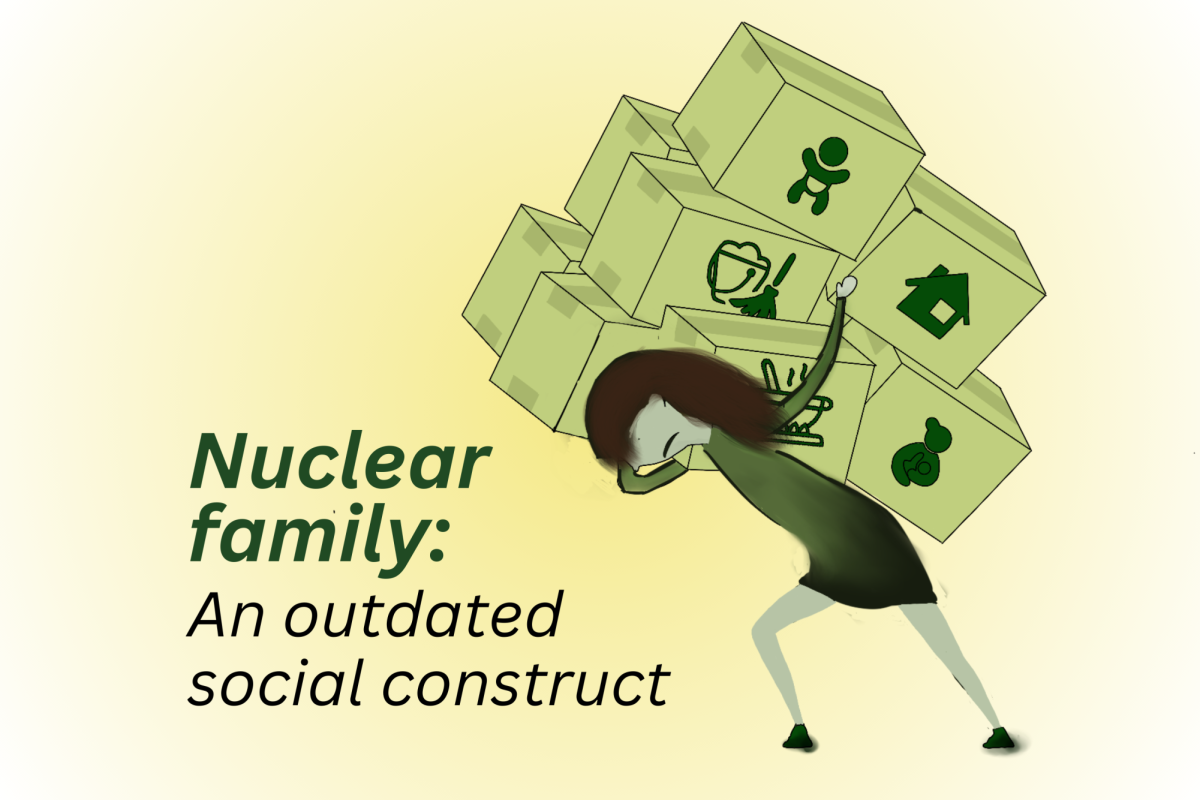The nuclear family, a term coined by anthropologist and ethnologist Bronisław Malinowski in 1949 and popularized during the Cold War, is regarded as the quintessential form of family structure by sociologists, more commonly described as a family that consists of a husband and wife along with their children. While not inherently toxic, the idealized and common social expectation of a nuclear family has been criticized to be an outdated social norm.
Though the term “nuclear family” is relatively new, the social norm was prevalent in the 18th century. While men were expected to be the leaders of their households, women were forbidden many basic rights to the point where the husbands assumed all legal responsibilities for their wives, both inside and outside the house. Nonetheless, many reforms gave women their basic rights over time. The concept of a nuclear family and its formulaic structure was further popularized as World War II and the Great Depression came to an end, a period in which people gained a restored sense of confidence and security after a prolonged period of war, economic hardships and uncertainty. This paved the way for a middle class that was infused with certain expectations about culture and social behavior, including the traditional notion of a patriarchal family with clearly defined gender roles.
“Growing up, it was expected that, when girls became wives, they would have more responsibility than their husbands for childcare and anything related to home life,” English teacher Terri Fill said. “But today with more and more dual-income families, that’s really difficult to sustain.”
While conceptions of marriage and family have largely modernized as society has evolved, the outdated societal expectations have trickled down to modern-day practices within a household. According to the European Institute for Gender Equality, globally, 91% of women with children spend one or more hours daily on housework, while only 30% of men do the same.
“I feel like a lot of people undervalue housekeeping because, without it, your life would be really hard,” sophomore Amelia Chi said.
Furthermore, many women past their 20s often feel pressure to get married, seeing it as a standard for happiness. From societal and family pressure to healthcare benefits granted by the government, marriages that solidify certain financial advantages and resolve family tension may seem appealing to many individuals.
Despite the weight of housework and raising children, few families receive government aid unless their household income falls below the poverty level. Families often resort to overworking themselves to receive affordable healthcare, like speeding up the process of marriage or picking up second jobs. The nuclear family expands beyond the idea that it’s an outdated expectation since it’s prevalent today, as seen when women’s labor is seen as obligatory attachments to their family, rather than full-time jobs, therefore unessential for the government to compensate.
“Watching people around me for the last 40 years, it does seem that a lot of labor in the household is almost de facto — it’s associated with which gender role you play in a relationship,” school counselor Shana Howden said.
For instance, if a wife or husband has a household task to tend to, like dropping kids off at doctor’s appointments during working hours, the wife’s career obligations may often be deprioritized in comparison to the husband’s job. In this case, the woman is then expected to take time off work to take care of domestic duties. Because domestic labor isn’t paid for substantially, it often becomes invisible. Wives who take on two jobs — housekeeping and waged labor — are often only recognized for their job that brings additional income to the family.
Regardless of the overall flaws of the nuclear family, the pressure for nuclear families continues to be enforced by influential individuals in modern-day society. During the first Republican debate for the 2024 presidential election, candidate Vivek Ramaswamy touted the nuclear family as a system that needs to be preserved and encouraged by the government. While critics acknowledge the advantages of the nuclear family, many believe that his comments solidify harmful gender stereotypes and undermine the toxicity of the nuclear family.
On the contrary, the private sector is implementing initiatives with the goal of giving flexibility to its employees who have children. For instance, flextime is a system that gives employees the choice of when to start and finish their shifts at work given a certain amount of hours they need to fulfill, while also mandating core hours in which they are required to be at work. As flextime is available for both parents, it mitigates the constraint of unequal distribution of domestic labor between the two parents.
“Things have certainly changed to be more equitable,” Fill said. “It may not be perfect yet, but I think it’s 1 million times better than it was for my mother.”












































































